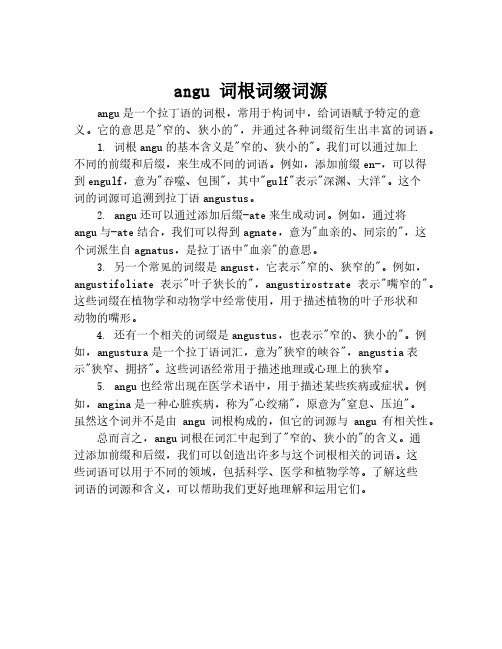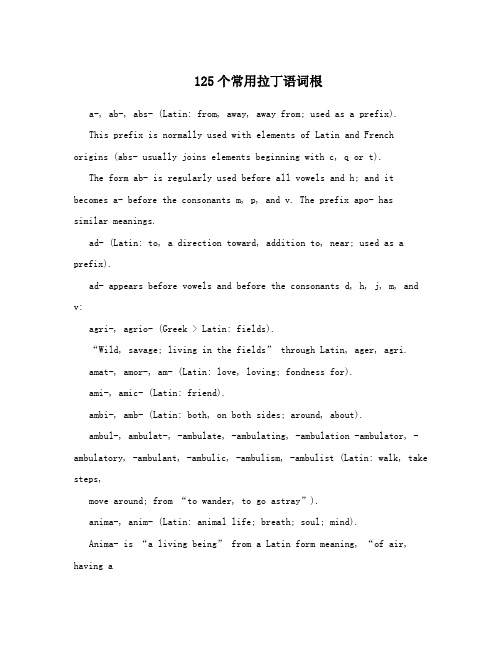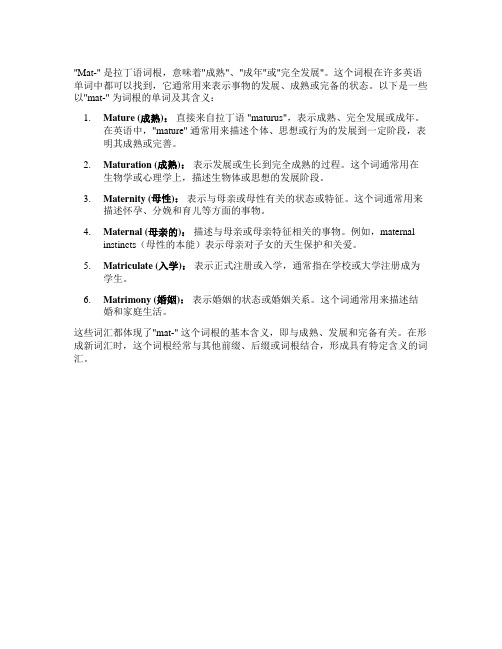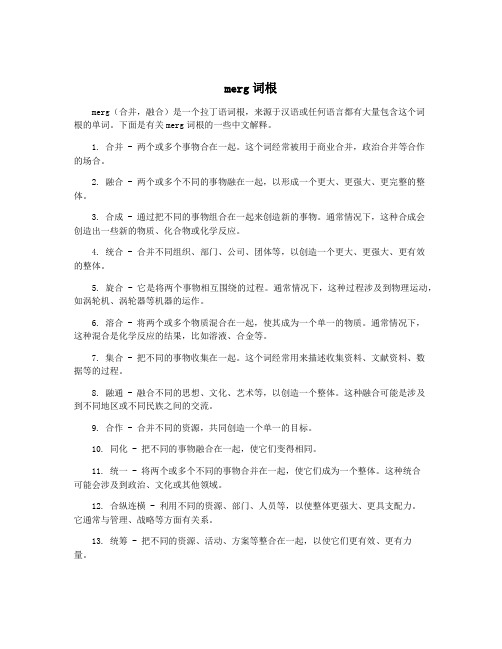拉丁语词根
migr词根

migr词根
migr词根是一个拉丁语词根,意为“移动”或“迁徙”。
它在英语中被广泛使用,特别是在描述动物迁徙和人类移民方面。
下面将对migr 词根的主要内容进行展开。
首先,migr词根在动物学中被广泛使用,用来描述动物的迁徙行为。
例如,鸟类和鱼类经常进行长途迁徙,这些迁徙既可以是季节性的,
也可以是周期性的。
鸟类迁徙通常是为了避免寒冷的冬季,而鱼类迁
徙则是为了寻找更好的繁殖场所和食物。
其他动物,如大象、海豹和
海龟等,也会进行长途迁徙,以寻找更好的食物和栖息地。
其次,migr词根在人类移民方面也有广泛的应用。
人类移民可以是自愿的,也可以是被迫的。
自愿的移民通常是为了寻求更好的经济机会、教育和生活条件。
被迫的移民通常是由于战争、政治迫害和自然灾害
等原因导致的。
无论是自愿的还是被迫的移民,他们都要面对新的文化、语言和生活方式,这对他们的适应能力提出了很大的挑战。
除了动物迁徙和人类移民,migr词根还在其他方面有广泛的应用。
例如,在计算机科学中,迁移学习是一种机器学习技术,它允许将已经
学习的知识应用于新的问题领域。
在医学中,迁移性疾病是指可以从
一个人传染给另一个人的疾病,例如流感和艾滋病等。
总之,migr词根在我们的日常生活中有着广泛的应用。
它可以用来描述动物迁徙、人类移民、计算机科学和医学等领域。
了解这个词根可
以帮助我们更好地理解和应用这些术语,从而更好地理解我们的世界。
拉丁语词根(精.选)

relict-
遗下(abandon)
放弃(relinquish)
残存物(relict)
rideō
ris-
笑(laugh, smile)
嘲笑(deride)可笑的(ridiculous)
rumpō
rump-
rup-
rupt-
破(break)
破裂(rupture)
sciō
sc-
sciv-
scit-
pulchr-
美(beautiful)
美丽(pulchritude)
rex
rēg-
王(king)
帝王的(regal)
rūs
rūr-
农场(farm)
乡下的(rustic)
sinister
sinistr-
左(left)
凶恶的(sinister)
terra
terr-
大地(land)
地形(terrain)
unda
知道(know)
科学(science)
scrībō
scrīb-
scrips-
scrīpt-
写(write)
体献(inscribe)
乡村房屋(country house)
别墅(villa)
村庄(village)
vir
vir-
男人(man)
有男子气概的(virile)
vulpinae
vulp-
狐(fox)
狡猾的(vulpine)
拉丁语动词词根
原词
现在词根
完成时词根
过去完成时词根
含义
常见衍生词
agō
ag-
eg-
āct-
plaud词根

plaud词根plaud是一个拉丁语词根,意思是“拍手,鼓掌,赞扬”。
它在英语中有很多派生词,例如applaud(鼓掌,赞扬),plaudit(称赞,掌声),explode(爆炸,从字面上理解为“发出巨大的掌声”),implode(内爆,从字面上理解为“向内拍手”)等。
本文将介绍plaud词根的来源,含义,用法和例句。
plaud词根的来源plaud词根来自拉丁语动词plaudere,意思是“拍手,鼓掌,赞扬”。
它可能与希腊语动词πλαττω(platto),意思是“拍打,击打”,有关。
plaudere在古罗马时期是一种表达喜悦,赞同或敬意的方式,尤其是在剧院或政治场合。
例如,当罗马人看完一场戏剧或演讲后,他们会用掌声来表示他们的感受。
如果他们非常喜欢,他们会说“Plaudite!”(请鼓掌!)。
如果他们不喜欢,他们会用嘘声或口哨来表示他们的不满。
plaud词根的含义plaud词根在英语中主要有两个含义:一是“拍手,鼓掌”,二是“赞扬,称赞”。
这两个含义都反映了plaudere的原始意义,即用掌声来表达对某人或某事的肯定或尊敬。
例如:He received a standing ovation from the audience.(他得到了观众的起立鼓掌。
)She applauded his courage and honesty.(她赞扬了他的勇气和诚实。
)plaud词根的用法plaud词根在英语中有很多派生词,它们可以分为以下几类:以applaud为基础的词applaud是一个动词,意思是“拍手,鼓掌”,或者“赞扬,称赞”。
它可以用于以下几种形式:applaud sb/sth:表示对某人或某事表示赞许或敬意。
例如:We applaud the government for its decision.(我们赞扬政府的决定。
)The crowd applauded the singer.(人群为歌手鼓掌。
angu 词根词缀词源

angu 词根词缀词源angu是一个拉丁语的词根,常用于构词中,给词语赋予特定的意义。
它的意思是"窄的、狭小的",并通过各种词缀衍生出丰富的词语。
1. 词根angu的基本含义是"窄的、狭小的"。
我们可以通过加上不同的前缀和后缀,来生成不同的词语。
例如,添加前缀en-,可以得到engulf,意为"吞噬、包围",其中"gulf"表示"深渊、大洋"。
这个词的词源可追溯到拉丁语angustus。
2. angu还可以通过添加后缀-ate来生成动词。
例如,通过将angu与-ate结合,我们可以得到agnate,意为"血亲的、同宗的",这个词派生自agnatus,是拉丁语中"血亲"的意思。
3. 另一个常见的词缀是angust,它表示"窄的、狭窄的"。
例如,angustifoliate表示"叶子狭长的",angustirostrate表示"嘴窄的"。
这些词缀在植物学和动物学中经常使用,用于描述植物的叶子形状和动物的嘴形。
4. 还有一个相关的词缀是angustus,也表示"窄的、狭小的"。
例如,angustura是一个拉丁语词汇,意为"狭窄的峡谷",angustia表示"狭窄、拥挤"。
这些词语经常用于描述地理或心理上的狭窄。
5. angu也经常出现在医学术语中,用于描述某些疾病或症状。
例如,angina是一种心脏疾病,称为"心绞痛",原意为"窒息、压迫"。
虽然这个词并不是由angu词根构成的,但它的词源与angu有相关性。
总而言之,angu词根在词汇中起到了"窄的、狭小的"的含义。
通过添加前缀和后缀,我们可以创造出许多与这个词根相关的词语。
ritual词根

ritual词根"Ritual" 这个词来自于拉丁语的词根"ritus",在英语中被用作表示宗教、仪式和典礼的词汇。
下面将详细介绍"ritus" 这个拉丁语词根的含义,以及"ritual" 这个词在演变过程中的应用。
拉丁语词根"ritus":拉丁语中的"ritus" 指的是仪式、典礼、宗教仪式或传统仪式。
这个词根包含了与宗教、仪式和礼仪相关的含义。
在古代罗马文化中,"ritus" 常常用于描述与祭祀、婚礼、葬礼等仪式有关的事物。
"Ritual" 在英语中的应用:"Ritual" 是由"ritus" 派生而来的英语单词,它通常用来描述一系列按照固定程序进行的仪式或典礼。
这些仪式可以涉及宗教、社会、文化或个人层面,具体形式包括但不限于祭祀、婚礼、葬礼、节日庆典等。
"Ritual" 的应用不仅限于宗教领域,还扩展到了社会和文化的方方面面。
在社会学和人类学中,研究人员经常使用"ritual" 来描述不同文化中的仪式和习俗,以及这些仪式对于社会结构和个体认同的影响。
"Ritual" 的相关概念和含义:1.Symbolic Actions(象征性行为):仪式通常涉及到象征性的行为,这些行为不仅仅是物理上的动作,更是具有象征意义的符号。
2.Cultural Identity(文化认同):仪式在文化中扮演着重要的角色,它们有助于塑造和传承文化认同,将价值观和信仰代代相传。
3.Social Cohesion(社会凝聚力):通过共同参与仪式,社会群体的成员之间可以建立联系,增强社会凝聚力。
4.Life Transitions(生命过渡):仪式通常伴随着个体生命过渡阶段,如出生、成年、婚姻和死亡等,为这些重要时刻赋予意义。
125个常用拉丁语词根

125个常用拉丁语词根a-, ab-, abs- (Latin: from, away, away from; used as a prefix).This prefix is normally used with elements of Latin and Frenchorigins (abs- usually joins elements beginning with c, q or t).The form ab- is regularly used before all vowels and h; and it becomes a- before the consonants m, p, and v. The prefix apo- hassimilar meanings.ad- (Latin: to, a direction toward, addition to, near; used as a prefix).ad- appears before vowels and before the consonants d, h, j, m, and v:agri-, agrio- (Greek > Latin: fields).“Wild, savage; living in the fields” through Latin, ager, agri.amat-, amor-, am- (Latin: love, loving; fondness for).ami-, amic- (Latin: friend).ambi-, amb- (Latin: both, on both sides; around, about).ambul-, ambulat-, -ambulate, -ambulating, -ambulation -ambulator, -ambulatory, -ambulant, -ambulic, -ambulism, -ambulist (Latin: walk, take steps,move around; from “to wander, to go astray”).anima-, anim- (Latin: animal life; breath; soul; mind).Anima- is “a living being” from a Latin form meaning, “of air, having aspirit, living”, which in turn comes from another form meaning, “breath of air, air, soul, life”.anni-, annu-, enni- (Latin: year, yearly).ante-, anti-, ant- (Latin: before, in front of, prior to, forward; used as a prefix).Compare this element with anti-, meaning “against”. Anti-, withthemeaning of “before”, is found in very few words, such as: “antipasto” (from Italian). and “anticipate” with its various forms, plus a few scientific terms.aqua-, aquatic-, aqui-, aqu-, -aquatically, aque-, -aqueous (Latin: water).audio-, aud-, audi-, audit- (Latin: hearing, listening, perceptionof sounds).bene-, ben-, beni- (Latin: good, well) and bon- (Latin: good).brevi-, brev- [brie-, bri-] (Latin: short).cand-, can-, cend- (Latin: glow; white).capit-, capt-, ceps-, chapt-, chef, cip-, -cup- (Latin: head, leader, chief, or first).carno-, carn-, carne-, carni- (Latin: flesh, meat).celer- (Latin: fast, speed, swift, rapid).centi-, cent- (Latin: hundred; a decimal prefix used in the international metric system for measurements).This prefix is used in the metric [decimal] system as, one-hundredth [U.S.] and hundredth [U.K.], and denotes 1/100th of a unit or 10-2 [0.01]. The metric symbol for centi- is c.-cise, -cis, -cide (Latin: a suffix; to cut, cut).-cide, -cides, -cidal (Latin: a suffix; kill, killer; murder, to cause death, slayer; cutter; “to cut down”).Don’t confuse this element with the another -cide that means “to cut”;although -cid e, “death”, is related to -cise, -cide, “to cut down”.circum- (Latin: around, about, surrounding, on all sides; literally, “in a circle”).com- [co-, cog-, col-, con-, cor-] (Latin: together, with; used as a prefix).contra-, contro-, counter, contre- (Latin: against, opposed to, opposite, contrary; used as a prefix).cor-, cord-, cour- (Latin: heart).corp-, corpor-, corpus- (Latin: body).cred-, credit-, creed- (Latin: believe, belief, faith, confidence, trust).cura-, cur- (Latin: heal, cure [care for, give attention to, to take care of]).cur(r).-, curs-, -course (Latin: run, go).dei-, div- (Latin: God, god [deity, divine nature]).adieu (French): Goodbye (literally, “I commend you to god.”).dento-, dent-, denta-, dentino-, denti-, dentin- (Latin: tooth, teeth).dic-, dict- (Latin: talk, speak, say, tell, declare).digit (Latin: finger, toe).dor-, do-, don- (Greek > Latin: gift).dorm-, dormi- (Latin: sleep, sleeping).duo-, du- (Latin: two; a number used as a prefix).duc-, -duce, -duct, -ducent, -ductor, -duction, -ductive, -ducer, -ducement,ducation (Latin: lead, leading, bring, take, draw).equ-, equi- (Latin: same, equal, similar, even).ex- (e-, ef-). (Latin: [out of, from]; [upward]; [completely, entirely]; [to remove from, deprive of]; [without]; [former]; used as a prefix).extra-, extro- (Latin: beyond, outside, on the outside, outward, external; used as a prefix).fac-, fact-, feas-, -feat, -fect, -feit, -facient, -faction, fic-, -fy, facil- (Latin: make, do, build, cause, produce; forming, shaping).fid-, fidel- (Latin: believe, belief, trust, faith).fin- (Latin: end, last, limit, boundary, border).flagr- (Latin: fire; burn, blaze).fluct-, flucti-, -flux, flu- (Latin: flow, wave).fortu-, fortun- (Latin: chance, fate, luck).frag-, frang-, fract-, fring- (Latin: break).fug-, -fuge, -fugit (Latin: drive away, flee, fly, run away).grad-, -grade, -gred, -gree, -gress (Latin: walk, step, take steps, movearound; walking or stepping).grav-, griev- (Latin: heavy, weighty).habili-, habil- (Latin: clothe, clothing; that which may be easily handled, suitable, fit, proper).ign-, igni-, ignis- (Latin: fire, burn).inter- (Latin: between [als among, mutually, together]; used as a prefix).intra- (Latin: within, inside, on the inside; used as a prefix).jet-, -ject, -jecting, -jected, -jection, -jector, -jectory; jac- (Latin: throw, send, fling, hurl, cast; gush; spurt).junct-, jug- (Latin: join, unite, yoke).lav-, lava-, lavat- (Latin: wash, bathe).linguo-, lingu-, lingua-, -linguist, -linguistic, -linguistical, -linguistically (Latin: tongue, language).luco-, luc-, luci-, lux, -lucence, -lucent (Latin: light, shine).locu-, loc- (Latin: talk, speak, say, word, speech).lumen-, lumin-, lum- (Latin: light, shine; source).luna-, luni-, lun-, lunu- (Latin: moon, light, shine).magni-, magn- (Latin: large, big, great).mal-, male-, mali- (Latin: bad, badly, harsh, wrong; ill; evil; abnormal, defective).This combining form has no etymological connection to “male”, meaning “man” or “masculine”; despite what some women may think.manu-, man-, mani- (Latin: hand).medio-, medi- (Latin: middle).migr-, migrat- (Latin: wander, moving).milli- [MIL i], mille-, mill-, mili- (Latin: thousand; a decimal prefix used in the international metric system for measurements).In the metric [decimal] system, milli- denotes 1/1 000 of a unit, thousandth [U.S.] and thousandth part [U.K.]; 10-3 [0.001] The metric symbol for milli- is m.mini-, minor-, minut-, minu- (Latin: small, little).miss-, -miss, -mis-, -mit, -mitt- (Latin: send, let go, cause to go; throw, hurl, cast).mort-, mor-, mori- (Latin: death, dead).multi-, mult- (Latin: many, much; used as a prefix).nom-, nomen-, nomin-, -nomia, -nomic (Latin: name).Don’t confuse this element with the Greek nomo- that means “law”.non- (Latin: nothing, not).novo-, nov-, novi- (Latin: new, recent; used as a prefix).omni-, omn- (Latin: all, every).pac-, peac-, peas- (Latin: peace, calm).pari-, par- (Greek: same, equal, equality, equal value). and peer, pair (Latin: same, equal, similar).pass-, pati- (Latin: suffering, feeling; enduring).ped-, pedi-, -pedal, -ped, -pede, -pedia (Latin: foot).petro-, petr-, petri-, peter- (Greek > Latin: stone, rock).port-, portat- (Latin: carry, bring, bear).port- (Latin: door, gate, entrance, harbor).poten-, pot-, poss-, -potent, -potence, -potency, -potential (Latin: power, strength, ability).pre- (prae-) (Latin: before [both in time and place]; used as a prefix).pro-, por- (Greek > Latin: before; forward; for, in favor of; in front of; in place of, on behalf of; used as a prefix).quir-, quisit-, quis-, que-, quer-, quest-, -quirement, -quirable, -quisition, -quisitive (Latin: ask, seek).re-, red- (Latin: back, backward, again; used as a prefix).retro-, retr- (Latin: back, backward, behind; used as a prefix).rupt-, -rupting, -ruption (Latin: break, tear, rend; burst).sana-, sani-, san- (Latin: healthy, whole; by extension: cure, heal, take care of).sci-, -science, -sciently, -scientific, -scientifically, -scient, -sciently (Latin: know, learn, knowledge).scrib-, script-, -scribe, -scription, -scriptive (Latin: write, record).sec-, seg-, -sect, -section, -sectional (Latin: to cut).semi- (Latin: half, partly, twice; used as a prefix).senso-, sens-, sensi-, sensori-, sent- (Latin: feeling, sensation, perception through the senses, be aware, discern by the senses).sed-, sedat-, -sid, -sess (Latin: sit).sol-, soli-, solo- (Latin: sun).soli-, sol- (Latin: one, alone, only).solv-, -solu-, solut-, -sol, -soluble, -solubility, -solvent (Latin: loosen, dissolve; untie, set free).sono-, son-, sona-, -sonous, -sonic, -sonically (Latin: sound).spec-, spic-, spect-, spectat-, spectro- -spectr, -spectful, -spection, -spective (Latin: see, sight, look, appear, behold, and examine).spiro-, spir-, spira-, spirat-, -spire, -spiring, -spiration, -spirational (Latin: breath of life, breath, breathing, mind, spirit, courage, “soul”).stato-, stat-, sta-, -static, -stasi, staso-, -stasis, -stasia, -stacy, -stitute, -stitution, -sist, -stasic, -stit- (Greek: standing, stay, make firm, fixed).stell- (Latin: star).stru-, struct-, -structure, -struction, -structive (Latin: build, construct, place together, arrange).sub- (Latin: under, below [suc-, suf-, sug-, sum-, sup-, sur-, sus-]; used as a prefix) andsubter- (Latin: under, beneath, secretly, less than; formed from sub-; used as a prefix).Don’t confuse the sur- in this element with the sur- in super-. Note: sub- regularly means “under”, but it often changes its form asit retains itsmeaning:super-, supra-, sur- (Latin: above, over, more than; excessive).Sur- is a form of super- formed through the French and shouldn’t be confused with another assimilated sur- form that comes from sub- and means: “under, below, beneath”. In some words, super- is amplified to mean: “on top of; higher in rank or position than; superior to; greater in quality, amount, or degree than others of its kind; to a degree greater than others of its kind; to a degree greater than normal; extra, additional”.tempo-, tempor- (Latin: time, occasion).Don’t confuse this tempo- element with other words that refer tothetemples, such as the flattened sides of the forehead or thebuildings used for religious worship or services. They simply have no connection.ten-, tent-, tin-, -tain, -tainment, -tenance, -tinence (Latin: hold, grasp, have).trans-, tran-, tra- (Latin: across, through, over, beyond, on the far side of; used as a prefix).Don’t confuse the tra- in this element with another tra- in “drag” or“draw”. Trans- becomes tra- before the consonants -d, -j, -l, -m, -n, and -v.ultra-, ult- (Latin: beyond, on the other side; excessive, to an extreme degree).uni-, un- (Latin: one, single; a number used as a prefix).vaga-, vag- (Latin: wander, move around).veloci-, veloc-, velo- (Latin: fast, speed, swift, and rapid).veri-, ver- (Latin: true, truth, real, truthfulness).verg-, -vergent, -vergence (Latin: bend, curve, turn, tend toward, incline).vers-, vert-, -verse, -version, -version, -versation, -versary, -vert, vort-, vors- (Latin: bend, turn).via- [-vey, -voy-] (Latin: way, road, path).vid-, video-, vis-, -vision, -visional, -visionally, visuo-, vu- (Latin: see, sight, view, look, perceive).vir-, viri-, virtu-(Latin: man, manliness; manhood; husband).vita-, vito-, vit- (Latin: life, living, pertaining to life, essential to life).voc-, voca-, vocat-, -vocation, -vocative, -vocable, vok-, -voke (Latin: call, talk, speak, say, voice, word).volen-, volunt-, voli-, vol- (Latin: will, free will, free choice; wish, personal desire).volv-, volu-, -volve, volut-, -volute, -volution (Latin: bend, curve, turn, twist, roll).vor-, vora-, -vore, -vorous, -vores, -vora, -vory (Latin: eat, consume, devour).Greek and Latin Root Words(希腊和拉丁语词根)Greek and Latin Root Words(希腊和拉丁语词根)Root Meaning English Wordschief, primary arch archetypeor firstancient/primitiarchaeo archaeologyveaster/astar astronomy straaudi hear audible bene good/well benefit bio life biology brev short abbreviation chloro green chlorophyll chrono time chronology derm skin dermatologist dic/dict speak dictionary fer carry transfer fix fasten affix gen birth generate geo earth geographygraph write graphic hemo blood hemoglobin herb plants herbaceoushydro water hydrate jur/just law jury log/loguword/thought dialogueeluc light lucid manu hand manual meter/measure thermometer metrneg no negate ocu eye ocular olig few oligarchy op/oper work operation osteo bone osteoporosis path feeling sympathy ped child pediatrics phil love philosophy phys body/nature physical pod foot podiatristproto first prototype pseudo false pseudonym scrib/scwrite scribble riptsect cut dissectsol alone solitary struct build construct tact touch contact telefar off telephone ter/terearth territoryrvac empty vacant ver truth verify verb word verbal vid/vis see video Greek and Latin Prefixes-/-Suffixes* Prefix/SMeaning English Words uffixad- to addict-al relating to maternal ambi- both ambidextrousante- before antecedent anti- against antifreeze -arium place of aquarium auto- self autobiography centi- hundred centimeter circum- around circumvent con- with concert de- from/down depart deci- ten decimeter di- two diameter dis- opposite disablequality/stat-dom freedomeex- out exit hetero- different heterogeneous hypo- too little hypoactive -ic relating to poeticquality/stat-ile juvenileein- not invalid inter- between interstateintra- within intramuralsquality/stat-ism catholicismeone who-ist biologistpracticesmacro- large macrobiologist micro- small microbiologist milli- thousand millipede mis- bad miscarriage mono- single monotheism nano- billion nanosecond neo- new neonatology -ology study of biology omni- all omniscientquality/stat-ous nebulousepan- all pantheon per- throughout pervade peri- all around periscope poly- many polygon post- after postponepre- before precede pro- forward progress re- again reappear retro- back retrogress sub- under submarine super- more than supermarket sym- together symbolquality/stat-tion preservatione-ular relating to cellular un- not unwilling *Most of theseprefixes/suffixes/roots are takenfrom Mr. Hanno's unit on Greek roots. Subject and Reference Resources。
caucus 词根

caucus 词根Caucus是一个源自于拉丁语的词根,常用于英语中,具有多种含义和用途。
它可以是名词、动词或形容词,其意义广泛,涵盖了政治、组织和社交领域。
本文将具体介绍和探讨Caucus词根的来源、含义以及在不同领域中的应用。
一、词根的起源和含义Caucus一词最早出现在美国早期的政治运动中,最初用于描述一种旨在决策和组织活动的方式。
它源于拉丁语中的"caucus",意为"喧闹的聚会"。
这个词根最早在18世纪末的美国众议院中被使用,指的是一种特定形式的会议,在这种会议中,成员可以就特定议题进行辩论、决策和选举。
随着时间的推移,Caucus的用法逐渐扩展到其他领域,如政党内部的组织、社团活动以及商业会议等。
由于其多样化的含义,Caucus成为一个具有独特涵义的词根。
二、在政治领域的应用1.政党Caucus在政治领域,Caucus一词通常用来描述政党内部的组织和活动。
政党Caucus是一种党内会议,旨在讨论党派议题、制定议程、选举领导人以及协商党派政策等事务。
通过Caucus,政党能够就重要问题展开内部辩论,并协商出一致意见,从而更好地推进党派目标和政策。
2.地区Caucus除了政党内部的Caucus,一些地区或州份也会举办Caucus,用于选举候选人或就重要议题进行公开辩论和讨论。
这种地区Caucus在美国的总统选举中尤为常见,例如爱荷华州的Caucus就被视为美国总统选举中的重要一环。
三、在社团和组织中的应用1.社团Caucus在社团和组织中,Caucus一词用于指代一种成员之间的集会形式,旨在讨论和决策特定议题。
社团Caucus提供了一个平台,使成员可以自由表达观点、提出建议并参与决策过程。
这种组织形式能够促进成员之间的互动和合作,从而推动组织的发展和目标的实现。
2.商业Caucus此外,Caucus在商业领域也有应用。
商业Caucus指的是一种商业会议或商务活动,在这种活动中,来自不同公司或行业的代表可以交流经验、分享最佳实践、解决问题,并探讨行业发展的趋势和机会。
intellig词根,理解

intellig词根,理解
"Intellig" 是一个拉丁语词根,源自 "intelligere",意为“理解”、“领会”或“认识”。
这个词根在英语中广泛用于构造与智力、理解、认知和知识有关的单词。
以下是一些包含 "intellig" 词根的单词示例及其含义:
1.Intelligence(智力,情报):指理解和学习的能
力,或者指收集和分析信息(如在军事或政治上)
的活动。
2.Intelligent(智能的,聪明的):形容词,指具有
高度理解和学习能力的。
3.Intelligible(可理解的,清晰的):形容词,指能
够被容易理解或识别的。
4.Intelligentsia(知识分子):指一群在文化、艺术
或政治方面具有影响力的、高度教育的人。
5.Intelligencer(情报员,密探):指收集和提供情
报或重要信息的人。
这些单词展示了 "intellig" 词根在英语中的广泛应用,主要关联着理解、智慧和知识的领域。
通过这个词根,我们可以更好地理解与智力相关单词的意义。
humiliate的拉丁词根

"humiliate" 这个词的拉丁词根可以追溯到拉丁语中的词根 "humilis"。
以下是相关的详细解释:
1."humilis"(拉丁语):这个拉丁词根表示"低下的"、"卑微的"或"谦卑的"。
它是 "humus"(大地、土壤)的衍生词,暗示着与大地相关的低下和谦卑。
从这个词根派生出了 "humilis" 这个形容词,用来描述人或事物的卑微或谦
卑的性质。
2."humilio"(拉丁语):这是 "humilis" 的动词形式,表示"使卑微"或"使谦卑
"。
它关联到 "humiliare" 这个动词,表示"使受辱"或"使谦卑"的行为。
3."humiliation"(英语):这个词是 "humiliate" 的名词形式,表示"受辱"、"
谦卑"或"卑微"的状态。
"Humiliation" 用来描述被羞辱或被降低地位的情况。
"humiliate" 一词的使用源自对 "humilis" 这个拉丁词根的衍生词,暗示了降低、羞
辱或使卑微的含义。
在英语中,"humiliate" 表示羞辱、侮辱或使某人感到卑微。
mature词根

"Mat-" 是拉丁语词根,意味着"成熟"、"成年"或"完全发展"。
这个词根在许多英语单词中都可以找到,它通常用来表示事物的发展、成熟或完备的状态。
以下是一些以"mat-" 为词根的单词及其含义:
1.Mature (成熟):直接来自拉丁语 "maturus",表示成熟、完全发展或成年。
在英语中,"mature" 通常用来描述个体、思想或行为的发展到一定阶段,表明其成熟或完善。
2.Maturation (成熟):表示发展或生长到完全成熟的过程。
这个词通常用在
生物学或心理学上,描述生物体或思想的发展阶段。
3.Maternity (母性):表示与母亲或母性有关的状态或特征。
这个词通常用来
描述怀孕、分娩和育儿等方面的事物。
4.Maternal (母亲的):描述与母亲或母亲特征相关的事物。
例如,maternal
instincts(母性的本能)表示母亲对子女的天生保护和关爱。
5.Matriculate (入学):表示正式注册或入学,通常指在学校或大学注册成为
学生。
6.Matrimony (婚姻):表示婚姻的状态或婚姻关系。
这个词通常用来描述结
婚和家庭生活。
这些词汇都体现了"mat-" 这个词根的基本含义,即与成熟、发展和完备有关。
在形成新词汇时,这个词根经常与其他前缀、后缀或词根结合,形成具有特定含义的词汇。
拉丁语词根

homō ignis
insula
finiflorfoliformfortfortfratrfrontfrugfum-
gen-
homin-
insul-
iūdex
iūdic-
iūs
iūr-
lachryma lachrym-
lex
lēg-
lūna
lūn-
lupus
lup-
magister magistr-
es-
sed-
sess-
secut- sum
fu-
futur-
veniō ven-
vent-
vertō
videō vivō volō
vert-
vidēvivvell-
vers-
vidvixvolu-
vers-
vīsvict-
寻求(seek) 易怒的
教师(teacher) 地方法官(magistrate)
大(big) 更大(bigger) 最大(biggest)
大小(magnitude) 主要(major) 最大(maximum)
坏(bad)
恶意(malice)
手(hand)
手动的(manual)
海(sea)
海事的(maritime)
母(mother)
狡猾的(vulpine)
原词 agō amō audiō
拉丁语动词词根
现在词根 完成时词根 过去完成时词根 含义
常见衍生词
ag-
eg-
āct-
做(do)
代理人(agent) 行动(action)
am-
amav-
amat-
爱(love) 迷恋(enamor)
caut词根

caut词根“caut”是一个拉丁语的词根,它的意思是“小心、注意、警惕”。
这个词根常常出现在各种单词中,例如“caution”、“cautious”、“uncanny”、“caveat”、“precaution”等等。
这些单词都有一个共同点,就是表达了一种小心谨慎的态度。
首先,让我们来看看“caution”这个词。
它的含义是警告、告诫、小心。
这个单词强调了对危险或风险的警觉性,它告诉我们必须时刻保持警觉,小心行事,以免出现意外。
另一个相关的词是“cautious”,它的意思是谨慎的、小心的。
这个词强调了必须对每一个细节都保持警觉,从而避免因过于鲁莽而出事故。
这种小心谨慎的态度可以让我们保持头脑清醒、不冲动,以免犯错。
其次,让我们看看“uncanny”这个词。
这是一个很有趣的单词,它的意思是“超乎寻常的、神秘的、不可思议的”。
这个词用来形容那些让人感到神秘或者不可思议的事物。
通常,这种奇怪或者神秘的事物会引起人们的警惕,我们必须在对待它们时更加小心,以免受到不良影响。
最后,让我们看看“caveat”和“precaution”这两个单词。
它们都强调了一种预防措施,用来避免出现某种状况。
其中,“caveat”意思是“警告、告诫、注意事项”,它经常被用在合同或者协议中,表示“有需要注意的事项”;而“precaution”则强调了采取预防措施,以避免出现某种情况的必要性。
这些单词告诉我们,在面对可能出现的风险或者问题时,我们必须采取预防措施和注意事项,以免出现意外。
总之,“caut”这个词根告诉我们必须始终保持警觉、小心谨慎,以免出现意外。
这是一种非常重要的态度,它可以让我们避免犯错误和出现不必要的损失。
无论是在工作中还是在生活中,我们都应该时刻保持警觉,注意事故预防和安全保障,以确保自己和他人的健康和安全。
merg词根

merg词根merg(合并,融合)是一个拉丁语词根,来源于汉语或任何语言都有大量包含这个词根的单词。
下面是有关merg词根的一些中文解释。
1. 合并 - 两个或多个事物合在一起。
这个词经常被用于商业合并,政治合并等合作的场合。
2. 融合 - 两个或多个不同的事物融在一起,以形成一个更大、更强大、更完整的整体。
3. 合成 - 通过把不同的事物组合在一起来创造新的事物。
通常情况下,这种合成会创造出一些新的物质、化合物或化学反应。
4. 统合 - 合并不同组织、部门、公司、团体等,以创造一个更大、更强大、更有效的整体。
5. 旋合 - 它是将两个事物相互围绕的过程。
通常情况下,这种过程涉及到物理运动,如涡轮机、涡轮器等机器的运作。
6. 溶合 - 将两个或多个物质混合在一起,使其成为一个单一的物质。
通常情况下,这种混合是化学反应的结果,比如溶液、合金等。
7. 集合 - 把不同的事物收集在一起。
这个词经常用来描述收集资料、文献资料、数据等的过程。
8. 融通 - 融合不同的思想、文化、艺术等,以创造一个整体。
这种融合可能是涉及到不同地区或不同民族之间的交流。
9. 合作 - 合并不同的资源,共同创造一个单一的目标。
10. 同化 - 把不同的事物融合在一起,使它们变得相同。
11. 统一 - 将两个或多个不同的事物合并在一起,使它们成为一个整体。
这种统合可能会涉及到政治、文化或其他领域。
12. 合纵连横 - 利用不同的资源、部门、人员等,以使整体更强大、更具支配力。
它通常与管理、战略等方面有关系。
13. 统筹 - 把不同的资源、活动、方案等整合在一起,以使它们更有效、更有力量。
14. 一体化 - 把组织、制度等整合在一起,以创造一个更有效、更完整的整体。
一体化通常需要政府、企业、组织等多方合作。
拉丁语词根

配偶(spouse)
夫妇间的(conjugal)
cornu
corn-
角(horn)
独角兽(unicorn)
deus
de-
神(god)
神祗(deity)
diēs
diē-
一天(day)
每日的(quotidian)
discipulus discipul-
学生(student) 门徒(disciple)
dominus domin-
拉丁语名词和形容词词根
原词
缩略根词
含义
英语衍生词
acerbus acerb-
苦,尖刻 (bitte) r 尖酸刻薄的(acerbic)
acetum acet-
醋(vinegar)
酸的(acetic)
aedificium aedifici-
建筑(building) 大厦(edifice)
alacer alacr-
laudat-
赞扬 (praise)
赞成(applaud)
locat-
地点 (place)
地点(location)
lūs-
共谋
玩(play)
(collusion) 可笑的
(ludicrous)
沉(dip)
浮现(emerge) 浸入(immerse)
miss-
发送(send)委书托信((cmoimsmsiitv)e)
genus
homō ignis
insula
finiflorfoliformfortfortfratrfrontfrugfum-
gen-
homin-
insul-
iūdex
iūdic-
san词根

san词根
“san词根”常常出现在我们日常生活中的词汇中,但你知道它的意思吗?“san”是一个拉丁语词根,意思是“健康”或“有益的”。
在英语中,我们经常可以看到以“san”开头的词汇,比如sanitary(卫生的)、sanctuary(圣地)、sanitation(卫生设施)等等。
这些词汇都与健康、清洁和安全有关。
“san”词根的意思也可以延伸到心理健康方面。
比如,sanity(理智)、sanitarium(疗养院)等词汇都与心理健康和治疗有关。
人们常说保持健康的身体和心理是非常重要的,因此“san”词根所代表的意义也就显得尤为重要。
除了英语之外,“san”词根也在其他语言中出现。
比如在西班牙语中,“san”常常出现在表示健康和清洁方面的词汇中。
而在法语中,“san”则更多地与健康和医疗有关。
这些都表明了“san”词根在各种语言中都具有重要的意义。
在生活中,我们也常常会提到与“san”词根相关的概念。
比如在餐馆、酒店或者公共场所,我们都会看到卫生间、卫生纸、卫生间等与“san”词根相关的词汇。
这些词汇提醒着我们保持环境的清洁和健康。
总的来说,“san”词根所代表的意义是非常重要的。
它提醒着我们保持健康的身体和心理,同时也提醒着我们保持环境的清洁和卫生。
正因为如此,“san”词根在我们的日常生活中扮演着重要的角色。
让我们一起努力保持健康的身心和清洁的环境,为我们的生活增添更多的“san”元素。
- 1、下载文档前请自行甄别文档内容的完整性,平台不提供额外的编辑、内容补充、找答案等附加服务。
- 2、"仅部分预览"的文档,不可在线预览部分如存在完整性等问题,可反馈申请退款(可完整预览的文档不适用该条件!)。
- 3、如文档侵犯您的权益,请联系客服反馈,我们会尽快为您处理(人工客服工作时间:9:00-18:30)。
pet-
petiv-
petit-
寻求(seek)
攻击(attack)
易怒的(petulant)
请求(petition)
pōnō
pōn-
posu-
posit-
放(put)
组件(component)
位置(position)
portō
portat-
携带(carry)
举止,驱逐(deport)
premō
负担(load)
免罪(exonerate)
pater
patr-
父(father)
保护人(patron)
pavimentum
paviment-
地面(ground)
人行道(pavement)
penis
pen-
尾(tail)
阴茎(penis)
pes
ped-
足(foot)
行人的(pedestrian)
pulcher
front-
前额(forehead)
前面(front)
frux
frug-
果实,利益(fruit)
节俭的(frugal)
fumus
fum-
烟(smoke)
烟雾(fume)
genus
gen-
诞生、后代(birth, offspring)
世代(generation)
真正的(genuine)
homō
homin-
行动(action)
amō
am-
amav-
amat-
爱(love)
迷恋(enamor)
audiō
aud-
audiv-
audit-
听(hear)
听得见的(audible)
capiō
-cipiō
cap-
cep-
-cip-
capt-
-cept-
取(take)
能够(capable)
俘虏(captive)
接受者(recipient)
-primō
prem-
press-
press-
推(push)
压力(pressure)
pugnō
pugn-
pugnav-
pugnat-
战斗(fight)
好斗的(pugnacious)
putō
put-
putav-
putat-
想(think)
计算(compute)假定(putative)
relinquō
relinqu-
bonus
– melior
– optimus
bon-
– melior-
– optim-
好(good)
更好(better)
最好(best)
奖励(bonus)
改善(ameliorate)
最适宜的(optimum)
bōs
bov-
牛(cow)
像牛一样的(bovine)
canis
can-
犬(dog)
犬齿(canine)
人(human being)
杀人(homicide)
ignis
-
火(fire)
引燃(ignite)
insula
insul-
岛(island)
半岛(peninsula)
心胸狭隘(insularity)
iūdex
iūdic-
判断(judge)
公正的(judicial)
判决(adjudicate)
iūs
iūr-ห้องสมุดไป่ตู้
pulchr-
美(beautiful)
美丽(pulchritude)
rex
rēg-
王(king)
帝王的(regal)
rūs
rūr-
农场(farm)
乡下的(rustic)
sinister
sinistr-
左(left)
凶恶的(sinister)
terra
terr-
大地(land)
地形(terrain)
unda
aqua
aqu-
水(water)
水生的(aquatic)
audax
audac-
大胆的(brave, bold)
大胆的(audacious)
auris
aur-
耳(ear)
听觉的(aural)
avis
avi-
鸟(bird)
鸟舍(aviary)
bellum
bell-
战斗(war)
好斗的(bellicose)
corn-
角(horn)
独角兽(unicorn)
deus
de-
神(god)
神祗(deity)
diēs
diē-
一天(day)
每日的(quotidian)
discipulus
discipul-
学生(student)
门徒(disciple)
dominus
domin-
主人(lord)
领土(dominion)
敏捷(alacrity)
album
alb-
白(white)
相册(album)
alius
ali-
其它(er)
外侨(alien)
amicus
ami-
朋友(friend)
亲切的(amiable)
anima
anim-
灵魂,生(soul, life)
赋予生命(animate)
annus
ann-
年(year)
年度(annual)
页码(folio)
forma
form-
形状(form, shape)
形式(form)
fors
fort-
幸运(luck)
偶然的(fortuitous)
fortis
fort-
力量(strength)
坚毅(fortitude)
frater
fratr-
兄弟(brother)
兄弟会(fraternity)
frons
cervīx
cervic-
颈(neck)
子宫颈(cervix)
cīvis
civit-
公民(citizen)
平民的(civilian)
clāvicula
clavicul-
钥匙(little key)
锁骨(clavicle)
coniunx
coniug-
配偶(spouse)
夫妇间的(conjugal)
cornu
知道(know)
科学(science)
scrībō
scrīb-
scrips-
scrīpt-
写(write)
体献(inscribe)
世俗的(mundane)
narrat
narrat-
讲述(tells)
叙述者(narrator)
nihil
nihil-
虚无(nothing)
彻底毁灭(annihilate)
nox
noct-
夜(night)
夜的(nocturnal)
oculus
ocul-
眼(eye)
接种(inoculate)
onus
oner-
乡村房屋(country house)
别墅(villa)
村庄(village)
vir
vir-
男人(man)
有男子气概的(virile)
vulpinae
vulp-
狐(fox)
狡猾的(vulpine)
拉丁语动词词根
原词
现在词根
完成时词根
过去完成时词根
含义
常见衍生词
agō
ag-
eg-
āct-
做(do)
代理人(agent)
mal-
坏(bad)
恶意(malice)
manus
manu-
手(hand)
手动的(manual)
mare
mar-
海(sea)
海事的(maritime)
māter
mātr-
母(mother)
保姆(matron)
mora
mor-
延迟(delay)
延期偿付(moratorium)
mundus
mund
俗世(world)
地点(location)
lūdō
lūd-
lūs-
玩(play)
共谋(collusion)
可笑的(ludicrous)
mergō
merg-
mers-
沉(dip)
浮现(emerge)浸入(immerse)
mittō
mitt-
mīs-
miss-
发送(send)
委托(commit)书信(missive)
moveō
reliqu-
relict-
遗下(abandon)
放弃(relinquish)
残存物(relict)
rideō
ris-
笑(laugh, smile)
嘲笑(deride)可笑的(ridiculous)
rumpō
rump-
rup-
rupt-
破(break)
破裂(rupture)
sciō
sc-
sciv-
scit-
-gnōsc-
nosc-
nōt-
-gnōt-, -gnit-
知晓(know)
